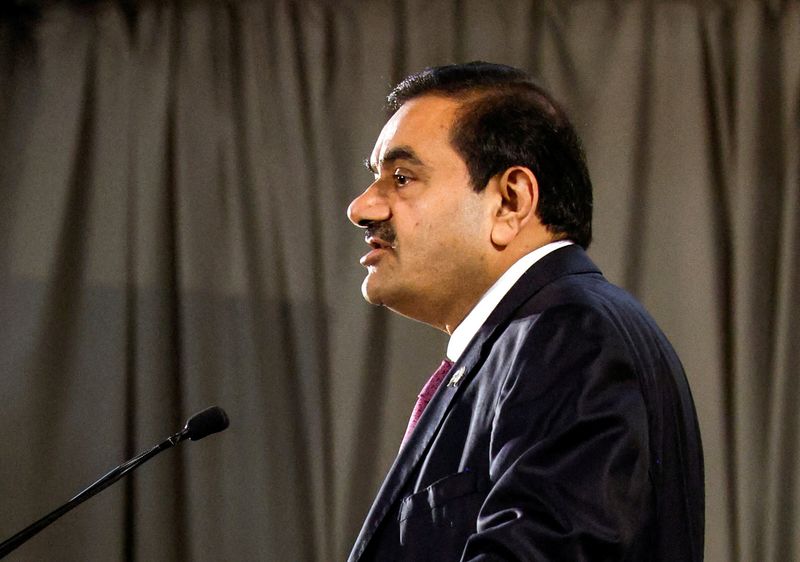By Jack Queen
(Reuters) - (This Nov. 21 story has been corrected to remove language suggesting that Gautam Adani faces a criminal charge of foreign bribery, independent of the three existing charges against him; and to remove and replace language describing the three charges and their potential penalties in paragraph 20)
Gautam Adani, the billionaire chair of Indian conglomerate Adani Group and one of the world's richest people, could face a long road to trial in the U.S. on criminal charges over his alleged role in a multi-billion-dollar fraud and bribery scheme.
Here’s a look at what’s next for Adani, who is accused of conspiring to pay about $265 million in bribes to Indian government officials to obtain contracts and develop India's largest solar power plant project.
WHAT IS HE CHARGED WITH?
The indictment alleges Adani and his co-defendants agreed to pay more than $250 million in bribes to Indian officials to obtain solar contracts worth an estimated $2 billion over 20 years.
Adani is charged with securities fraud, securities fraud conspiracy and wire fraud conspiracy.
U.S. law allows prosecutors to charge executives with foreign bribery when their companies do business in the U.S. and also gives broad jurisdiction over transactions that pass through U.S. financial institutions.
Prosecutors also allege Adani deceived U.S. investors by covering up the alleged bribes.
HAS ADANI BEEN ARRESTED?
No. If Adani is in India, U.S. prosecutors would need to ask the Indian government to extradite him under the terms of the two countries’ extradition treaty.
That process would be handled by a court in India, which would need to consider several factors including whether the crime he was charged with in the U.S. is also a crime in India, whether the charges are politically motivated or whether he could face inhumane treatment in the U.S.
Adani could fight extradition, and it is unclear how long the process might take. The billionaire is accused of bribing Indian government officials, which could make extradition more politically fraught.
HAS ADANI ENTERED A PLEA YET?
No. Adani has not been arrested and his whereabouts are unknown, though he is believed to be in India. He could not immediately be reached for comment.
In a statement Thursday, Adani Group said the charges were "baseless" and that the company is a "law-abiding organization, fully compliant with all laws."
CAN ADANI DISPUTE THE CHARGES IN COURT?
Yes, but until he appears in U.S. court, Adani's lawyers could only challenge the indictment on procedural grounds, for example by claiming U.S. prosecutors do not have the authority to charge him.
After Adani appears before a U.S. judge, his lawyers could attack the substance of the indictment by arguing the charges are legally deficient or unsupported by the facts.
Defendants generally face an uphill battle getting criminal charges thrown out because prosecutors enjoy the benefit of the doubt in the early stages of a case, and judges are reluctant to dismiss cases before juries have a chance to weigh the facts.
Prosecutors cite extensive evidence of the alleged crimes in the indictment, including in-person meetings with Indian officials and an extensive paper trail of cell phone and messaging app records.
Adani could also strike a plea deal with prosecutors by agreeing to admit to certain crimes in exchange for a lighter sentence, though prosecutors are under no obligation to negotiate. Any deal would also need to be approved by a judge.
WHEN COULD A TRIAL FOR ADANI HAPPEN?
A trial could still be a long way off even if Adani is extradited or surrenders in the U.S.
Adani’s lawyers would be entitled to litigate the admissibility of evidence and other legal questions before a trial could begin, as would lawyers for his seven co-defendants, who could seek separate trials.
Adani would be entitled to a speedy trial within 70 days under U.S. law, though he would likely waive that right to give his lawyers more time to fight the charges.
WHAT PENALTIES COULD ADANI FACE?

Adani could face decades in prison if convicted, but would probably receive far less time. He could also face monetary penalties. Any sentence would ultimately be up to the judge overseeing the case.
A jury of 12 would need to unanimously vote to convict Adani, and he could appeal a verdict against him.